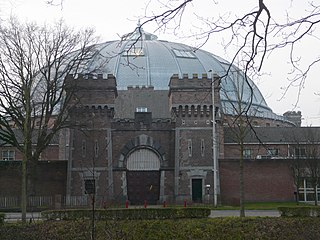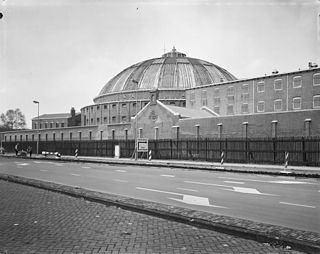 W
WThe criminal justice system of the Netherlands is the system of practices and institutions of the Netherlands directed at upholding social control, deterring and mitigating crime, and sanctioning those who violate laws with criminal penalties and rehabilitation efforts. The Netherlands' criminal code is based on the Napoleonic Code, imposed during the time of the French Empire. The Dutch largely kept the Napoleonic Code after their independence, but tempered it with a significantly more rehabilitative penological focus.
 W
WThe Bijlmerbajes was a prison complex in Amsterdam, the Netherlands, near the Amsterdam Amstel railway station. The official name is Penitentiaire Inrichting Over-Amstel, although it is also known as Penitentiaire Inrichting De Stadspoort or Penitentiaire Inrichtingen Amsterdam. Bijlmerbajes is part of the Custodial Institutions Agency of the Dutch Ministry of Justice within the Dutch criminal justice system.
 W
WThe Hague Penitentiary Institution is a Dutch prison that is part of the Judicial Institutions Department of the Ministry of Justice. It can accommodate more than 1,000 detainees and consists of two locations, at Zoetermeer and Scheveningen. The Zoetermeer location is for Systematic offenders and the Scheveningen location serves as a Penitentiary Psychiatric Center, the 'open design' Limited Secured Installation and Judicial Medical Center. A special independent unit in the Scheveningen location serves as a United Nations Detention Unit (UNDU) for international offenders where they remain in pre-trial detention under the responsibility of the United Nations like suspects of the International Criminal Tribunal for the former Yugoslavia (ICTY) and of the International Criminal Court (ICC).
 W
WThe Koepelgevangenis is a former prison in Arnhem, Netherlands. It is one of three Panopticon-style buildings situated in the country. Designed by Johan Metzelaar, the building was completed in 1886. A Rijksmonument, the prison closed in 2016. After the prison's closure, the building, along with the one at Haarlem, was used to house asylum seekers to the Netherlands.
 W
WThe Koepelgevangenis is a former prison in Breda, Netherlands, constructed in 1886, best known as the prison where convicted World War II collaborators were held captive.
 W
WThe Koepelgevangenis is a former prison in Haarlem, Netherlands. It is one of three Panopticon-style buildings situated in the country. Designed by Willem Metzelaar, the building was completed in 1901. A Rijksmonument, the prison closed in 2016. After the prison's closure, the building, along with the one at Arnhem, was used to house asylum seekers to the Netherlands.
 W
WLloyd Hotel is a hotel housed in a historic building in the Eastern Docklands of Amsterdam, commissioned by the Royal Holland Lloyd. Founded as a hotel, it initially housed travelling immigrants. Later, it was used as a detention centre and was also home to artists' studios. It is an official national monument of the Netherlands.
 W
WNieuw Vosseveld is a prison in Vught, Netherlands, part of the Custodial Institutions Agency of the Ministry of Justice and Security within the Dutch criminal justice system. Penitentiaire Inrichting Vught is now the general term used instead of Nieuw Vosseveld. Part of Nieuw Vosseveld is a maximum security prison; it holds some of Europe's most dangerous criminals including Islamic terrorists Mohammed Bouyeri and Samir Azzouz.
 W
WThe United Nations Detention Unit (UNDU) is a UN-administered jail. It is part of the Hague Penitentiary Institution's Scheveningen location, more popularly known as Scheveningen Prison, in The Hague, Netherlands. The UNDU was established in 1993 as part of the International Criminal Tribunal for the former Yugoslavia (ICTY) and currently houses detainees whose cases have been taken over by the International Residual Mechanism for Criminal Tribunals (IRMCT).